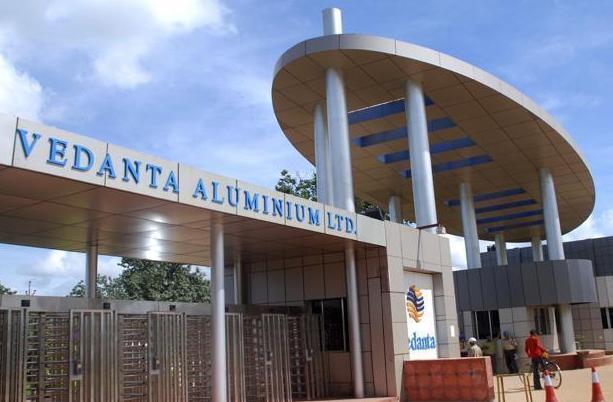Vedanta Rs 1,240 cr Proposal to Expand Odisha Aluminium Plant Nixed by Govt Panel

Image Courtesy: Sambad English
New Delhi: Billionaire businessman Anil Agarwal’s firm Vedanta’s proposal to invest Rs 1,240 crore to expand the capacity of an aluminium smelter in Jharsuguda district, Odisha, has been turned down by an expert panel of the Union ministry of environment, forests and climate change (MoEF&CC).
The Expert Appraisal Committee (EAC) rejected Vedanta’s proposal after the Naveen Patnaik government had approved it during an allegedly controversial public hearing last year in the face of opposition from locals and activists.
The proposal, which aims to increase the production capacity of the smelter from 16 million tonnes (MT) to 18 MT per annum, was rejected by the committee on the grounds that the terms and conditions which had been imposed upon Vedanta in lieu of the green clearance given to it 13 years ago have still not been implemented.
In addition, the committee has recommended issuing a ‘show-cause notice’ to Vedanta for failing to comply with the terms and conditions. “Proposal to be returned in its present form and the same would be considered by the EAC after the compliance to the existing EC [Environmental Clearance] conditions has been achieved by the Project Proponent,” the EAC observed in the minutes of its 42nd meeting held on August 12-13.
In June 2008, the then-United Progressive Alliance government had given the environmental clearance to Vedanta for setting up the 16 MTPA smelter. However, the EAC, an expert body under the environment ministry which studies potential impact of infrastructure projects on the local environment and advises mitigative measures, found that the smelter was violating several norms and hence denied the clearance.
Vedanta operates the smelter with power generated from the 1,215 mega watt (MW) captive thermal power plant of the project. The company has also been operating a 2,400 MW coal-based power plant adjacent to the smelter since 2010 after getting a separate environmental clearance. Interestingly, though Vedanta has no plans to expand the capacity of its captive thermal power plant, it had proposed “to acquire a large area” for the disposal of fly ash.
As per Vedanta’s proposal, the power requirement for the expanded smelter is 2,960 MW, out of which additional 400 MW will be obtained from the state power grid or from the adjacent coal-based power plant. All the nine units of the captive power plant are already operational.
Three fly ash ponds have been constructed by Vedanta within the project site to handle waste generated from burning of fossil fuels in the captive power plant. Vedanta has further claimed that it has been disposing off the fly ash generated by the captive plant without leaving any leftovers since 2018.
“There are three ash ponds in operation and PP [project proponent] has proposed to acquire a large area for ash disposal in spite of the new fly ash notification to utilise 100% ash. Further, PP mentioned that they were utilising 10% fly ash since 2018 and the pond ash shall be liquidated in the next five years. In view of this, seeking additional land for ash disposal was found to be not justifiable,” the EAC observed in its report.
The committee further noted: “Significant quantity of legacy ash stocks is still stored in the ash ponds located at three different locations in the vicinity of the project site. No effort has been taken to quantify the legacy ash stocks and utilise the same.”
However, reiterating that there are no plans for constructing any new fly ash pond, a spokesperson of Vedanta’s aluminium business told Newsclick, “We are not seeking to build any new fly ash pond as we have more than 100% fly ash utilisation and we have clarified the same to the relevant authorities. We are focussing on improving utilisation of our fly ash in cement, infrastructure, brick-making and other sectors.”
Despite having obtained clearance for the project in June 2008, Vedanta has achieved green development only around 27% of the total area as against the required 33%. Further, the project proponent is yet to set up a rainwater harvesting system at the site. The EAC has observed that the smelter’s consumption of fluoride, a non-biodegradable and harmful pollutant, is above prescribed limits.
Though five reserved forests exist within the 8-km radius of the project site, apparently, as per the EAC, Vedanta is yet to obtain permission from the state forest department regarding the impact of the project.
The divisional forest officer of Jharsuguda, Lalit Kumar Patra, told Newsclick that a site-specific wildlife conservation plan prepared by the project proponent was approved by the state forest department on April 30. “However, further clarity will be needed on the observation of the expert panel on the issue of clearance from the forest department,” he said.
The committee has observed that the amount of money set aside by Vedanta for expenditure on various aspects of the Environment Management Plan, as a proportion of the total capital expenditure on the expansion project, is inadequate as per international standards. Vedanta had set aside Rs 77.35 crore for capital expenditure on environment protection measures with additional annual recurring cost of Rs 30.60 crore.
“EMP [Environment Management Plan] cost of Rs 77.35 crore for a CAPEX of Rs 1,240 crore in aluminium smelter is far less (6.2%) than the world benchmarks of 15-20% of CAPEX on environment management,” the committee has observed.
In addition, as per the status report obtained by the MoEF&CC from its regional office in Odisha in December 2020, the project proponent is yet to comply with “all the recommendation stated in the Charter on Corporate Responsibility for Environment Protection with respect to the aluminium sector”.
The public hearing for the project was conducted by Odisha government on September 30 last year amidst a series of twists and turns. On August 27, 2020, the Odisha government issued a notification through its pollution control board fixing September 30 as the date of public hearing for the expansion project.
Locals and activists from the project-affected area sought postponement of the hearing due to the fears of spread of COVID-19. On September 21, a couple of residents of Brundamal village, which falls within the project-affected area, filed a public interest litigation (PIL) in the Odisha High Court (HC) demanding postponement of the hearing in view of the prohibitory orders issued by the special relief commissioner on August 31.
On September 28, a PIL filed earlier by the NGO Anchalik Parivesh Surakhya Sangh demanding postponement of the public hearing was dismissed by a division bench of the HC albeit without any consideration of the prohibitory orders. Nevertheless, on September 29, Justice KR Mohapatra took cognisance of the petition filed by the villagers and imposed an interim stay order on the public hearing. Word, reportedly, spread quickly in Jharsuguda that the public hearing was postponed.
However, barely a few hours later, the interim stay order was lifted. Vedanta appealed before the division bench to recall the interim order of the single-judge bench and on September 30, Justice Mohapatra issued a modified order that permitted the public hearing to be conducted as per schedule while allowing the aggrieved locals to participate in the event. As per sources, the public hearing was held at 3.30 pm on September 30, barely 10 minutes after the modified order was issued.
Locals alleged that, owing to the confusion, only 90 out of 10,000 residents of the five project-affected revenue villages could attend the public hearing. In his judgement delivered on October 9, Justice Mohapatra stated that there was no material before the court to verify the attendance in the public hearing. He left it upon Jharsuguda district magistrate Saroj Kumar Samal to decide upon the need, if any, to conduct a fresh public hearing.
Subsequently, Samal passed an order on October 18 stating that “the hearing conducted on 30.09.2020 with regard to the proposed expansion of aluminium smelter at Bhurkamunda is considered smooth and complete”.
Newsclick asked two national spokespersons of the ruling Biju Janata Dal (BJD) government and the party’s media office in Bhubaneswar whether Vedanta’s proposal would impact, if at all, investment and employment generation in Odisha. No response was received at the time of the publication of this article.
According to experts, Vedanta will find it extremely difficult to implement the environmental terms and conditions at this stage of the project after having ignored them for the past 13 years. Odisha-based activist Prafulla Samantara told Newsclick that since no cumulative environmental impact assessment has been conducted, expansion of the aluminium smelter will only increase pollution.
“The company was asked to first comply with all the terms and conditions issued in 2008. But its track record of complying with environmental norms is poor. It should now be ensured that, in accordance with the recommendation of the expert committee, no clearance whatsoever is granted till it complies with all earlier conditions,” said Samantara.
It is expected that Vedanta will soon make a fresh pitch with the Centre to get the proposal cleared. In response to Newsclick’s queries, Vedanta said that it has submitted its responses to the EAC along with a detailed action plan. “Vedanta is committed to the best Environment Management Systems, including air, water and solid waste management. It has adopted the Vedanta Sustainability Framework, comprising the best environment practices as is being followed by leading natural resources companies in India and abroad,” the Vedanta spokesperson said in response to a query on why the company has allegedly violated environmental norms in Jharsuguda.
Vedanta has “implemented best-in-class technologies, which have a long gestation period to deliver their full impact. The same have been submitted along with the action plan to relevant authorities. Vedanta embarked on its sustainability journey more than a decade ago, and as a part of overall design and framework, we recognize environment, social and governance (ESG) as an important pillar that guides our business decisions. ESG is our organisation’s biggest priority and we aim not only to be ESG compliant but also aspire to become an industry leader in sustainable and robust operations,” the spokesperson added.
The writer is an independent journalist.
Get the latest reports & analysis with people's perspective on Protests, movements & deep analytical videos, discussions of the current affairs in your Telegram app. Subscribe to NewsClick's Telegram channel & get Real-Time updates on stories, as they get published on our website.





















